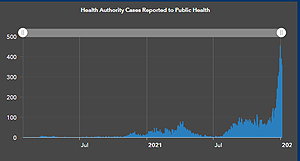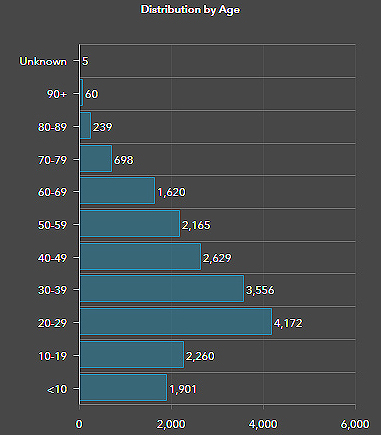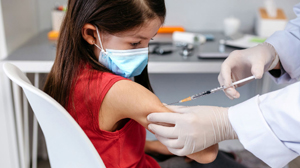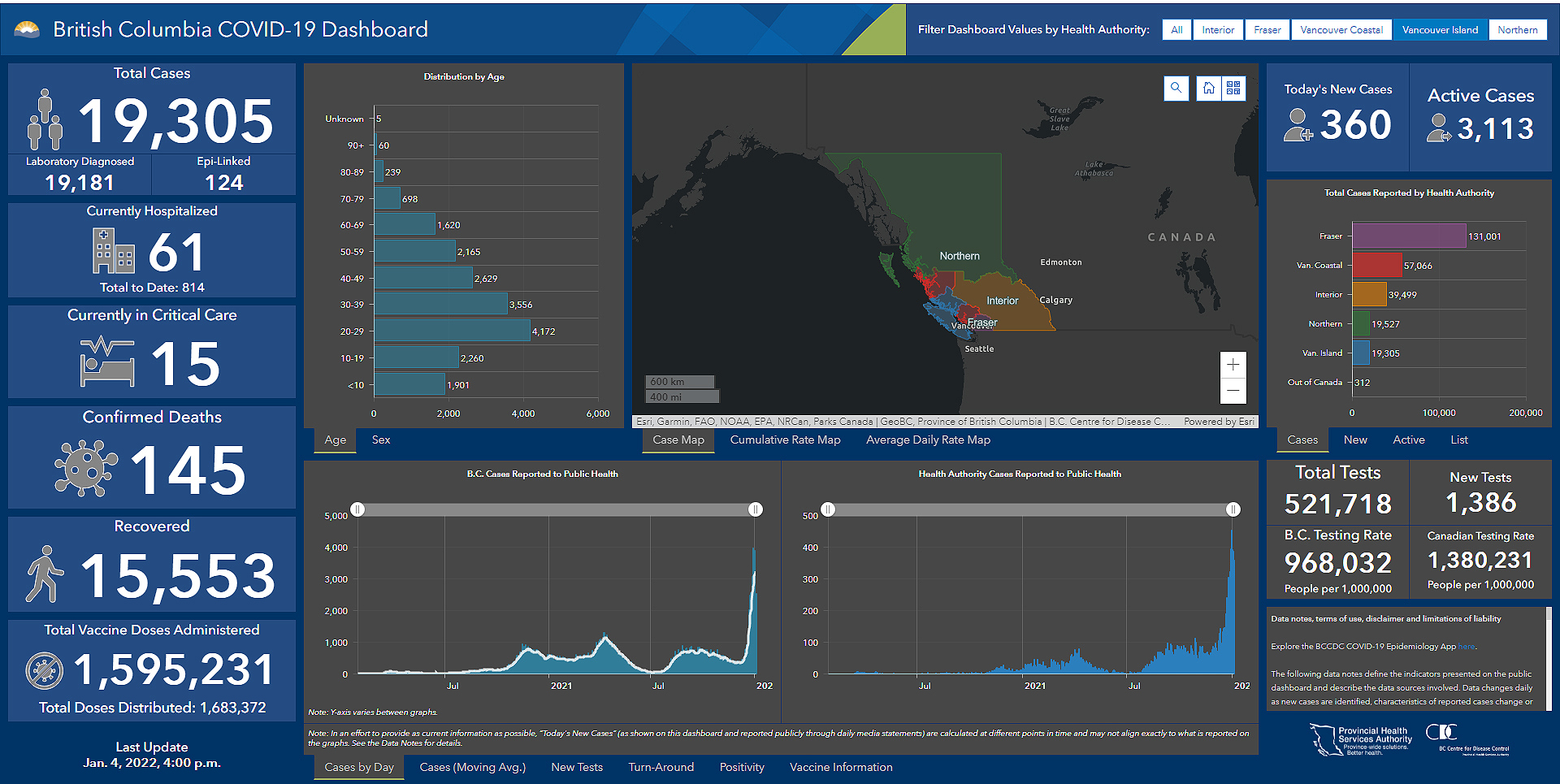Tuesday January 4, 2022 | VICTORIA, BC
by Mary P Brooke, B.Sc. | Island Social Trends
“The virus has changed and it’s spreading rapidly. We are in a different storm now.”
That’s what Provincial Health Officer Dr Bonnie Henry said as her opening statement in her first COVID update for 2022, held today Tuesday January 4. This is the first day back to regular COVID data reports since the year-end update on December 31, 2021.
Along with Health Minister Adrian Dix she reminded people about the power of vaccination. Specifically with regard to Omicron it leads to less severe illness for most people, and helps result in fewer deaths due to COVID. “Omicron remains mild in most children, Dr Henry noted today.
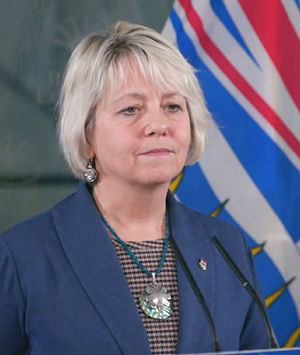
“Vaccinations are the best protection for all of us,” she said.
Rapid transmission:
The Omicron variant of the COVID-19 (SARS-CoV-2) virus spreads efficiently. Its high transmissibility results from how it replicates in the nasal passage and upper respiratory tract, which means the infection can take hold more easily than with the original COVID virus which attacked the deep lung tissue.
Case counts of Omicron are being pushed to record levels. Today, after a 4-day long weekend (December 31 to January 3) the total test-positive case count is 266,710 in BC (of those, 19,305 in Island Health). The new cases today were 2,542 across BC (360 of those in Island Health). Today there were four more deaths (two in Island Health) which brings the total pandemic COVID deaths to 2,427 (145 in Island Health).
But now those numbers are certainly lower than the true number of cases in the community, as Dr Henry encourages people to assume they have COVID if they have any cold or flu-like symptoms. That includes the milder-type of cold symptoms such as congestion, cough or sore throat.
For the record, 2022 is starting out with 20,602 children under age 10 in BC having contracted COVID in this pandemic (1,901 in Island Health). For youth ages 10 to 19 there have been 29,639 COVID cases (2,260 of those in Island Health). Over the New Year weekend alone, the number of children and youth with confirmed COVID cases went up by 175 in Island Health (76 more in ages 0 to 9, and 99 in ages 10 to 19 years).
Hospitalizations are currently at 298 across BC (86 in ICU), with 61 of those in Island Health (15 in ICU). Total hospitalizations pandemic-to-date stand at 13,109 in BC, with 814 of those in Island Health.
Responding differently:
Dr Henry the response to this phase of the pandemic (Omicron variant) is “slightly different”. Case numbers are skyrocketing and “reactive” response with contact tracing is beyond reasonable or possible now. Hospitalizations are increasing, and critical care is “slowly creeping up”.
“Due to the rate of transmission in BC, at this point most people in BC have a friend, family member or colleague infected,” said Dr Henry today. That may well depend on one’s income level, type of occupation, geographical region, and ages of people in a person’s circle of associates. Island Social Trends has launched a poll today (running to 11 am on Friday January 7) asking a simple yes/no question: “Do you know anyone directly (family, friend, coworker) who has been infected with COVID?“ The poll process is anonymous.
Omicron has the advantage:
“Omicron has the advantage,” Dr Henry said today. “BC has measures to try and slow that down.”
“Everything we do now and up to now has made a difference and has mattered,” she added.

“A lot of people will get sick, but your vaccination will protect you,” the PHO said with robust relief. Calling the next few weeks a challenging period, Dr Henry says lots of people will have upper respiratory illness.
“There will be a high number of people off work, including health-care workers and educators who will not be at work because they are ill,” Dr Henry told media today.
Businesses advised to prepare:
Today Dr Henry addressed businesses directly, saying they should prepare for a workforce down to about one-third of normal levels, as people stay home sick with COVID infection.
“Reactivate your COVID safety plan, specific to your business,” she articulated.
Organize your business so you can operate with reduced numbers, was the message from BC’s top doctor to the business community.
Protect your employees, customers, family and friends. Use masks, keep distance from people, reduce the number of people in the same location at once. She gave the example of not having people “all in one lunchroom that is unventilated”. And wash your hands regularly, she reminded.
Schools during Omicron:
Schools are being asked to have a staggered start schedule. She reiterated her pandemic-long message as to how important in-class attendance is for social and emotional development as well as intellectual.
Last week schools were asked to “take stock and prepare plans” to deal with the likelihood of reduced staff. Curriculum continuity was also advised last week (by the Education Minister) as students are likely to be missing school as well due to illness.

“There will be numerous schools closing because of lack of staffing,” said BC Teachers Federation president Teri Mooring this morning, given the expected transmissibility of the Omicron-variant virus. During the Omicron wave “there may come a time where it’s just less disruptive to have everyone learning remotely or online,” she told Island Social Trends.
Dr Henry is hoping for “flexibility from everyone” including teachers, principals, administration, school districts, and students. “The focus is on the importance of schools. School remains our highest priority.”
“Getting students back to class as soon as possible and doing our best for children,” is a priority for Dr Henry and her public health team.
Wear masks in the classrooms and entire school setting. For children, the fit of a face mask is possibly the most important thing, say some experts, even more than the number of layers.
Pediatric infectious specialist Dr Fatima Kakkar, on CBC’s The National this evening, said “any cold must be thought of as COVID. Parents are to watch for congestion, cough and sore throat, said Dr Kakkar, which she noted is different from the original COVID virus that caused fever and gastrointestinal symptoms.
Masks:
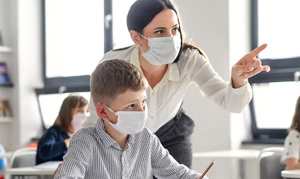
Wear masks properly and consistently; a three-layer mask is recommended, and fit is important. But they are not the only protection. There’s also vaccination, distance from others, minimizing time in crowded spaces.
Teachers feel they should all be issued N95s for use on the job in schools, as well as being prioritized for boosters (third dose) of COVID vaccine.
Long-term care:
Long-term care is also going to have staffing challenges, said Dr Henry today. Over the Christmas and New Year holiday season only essential visitors were allowed into long-term care. That had everything to do with expected staffing shortages. Soon, the expansion of that to allow one designated social visitor per resident will be implemented, as soon as rapid antigen testing is available at all long-term care facilities.
Pep talk:
“We can get through this next phase. We are weary, said Dr Henry, but said people can take encouragement from the likelihood that the Omicron wave will be “a few weeks”.
“Please continue to use all these layers you have available to you,” was today’s wrap-up message from Dr Henry.
Health Minister Adrian Dix closed his remarks with this: “Fight on. Continue to do what we can all do. Everyone’s efforts make the essential difference.” And of course, to follow public health guidance.
Vaccination profile:
Minister Dix focussed first on hospital bed numbers, as well as vaccination tallies. As of December 31, 2021 a first dose of COVID vaccine had been received by 4,399,771 people in BC. Second dose: 4,136,540. Third dose (booster): 961,014.
Since October 27, 2021 up to 2021 year-end there were 1,542,000 immunization invitations issued. That was 40 percent of those eligible. That will be up to 46 percent by the end of this week, said Dix.
About 100,000 health-care workers have received a third dose, said Minister Dix, and 159,637 people who are classified as clinically vulnerable.
Vaccinations are being available through pharmacies, outlined by Dix as at 710 locations, with more locations daily as the number of participating pharmacies is expected to increase by 254 this week, and by another 200 by mid-January. Pharmacies can administer booster shots, as well as first and second doses for anyone who is catching up.
The recommended interval between second and third doses is six months (182 days), Dr Henry outlined today. Children receiving the pediatric vaccine (for ages 5 to 11 years) can follow an interval of eight weeks.
BC CDC stats:
Today, in the first full COVID report in 2022, there have been 9,460,862 total COVID doses administered in BC (1,595,231 in Island Health). That’s a tally of all types: mRNA types Pfizer-BioNTech (30 mcg) and Moderna (30 mcg), viral vector type AstraZeneca, and the pediatric mRNA Pfizer shot (10 mcg) for children ages 5 to 11 years.
It’s quite clear that case numbers have shot up dramatically, but that has to do with the nature of the Omicron variant and how it spreads and infects. What’s more important to watch going forward are the numbers and rate of hospitalizations as well as ICU admissions and deaths.
===== RELATED:
BC teachers want N95 masks & booster priority (January 4, 2022)
Education Minister offers assurances on New Year’s Day (January 1, 2022)
K-12 phased return in Jan 2022 due to Omicron (December 29, 2021)
High case numbers Dec 29 as Omicron spreads (December 29, 2021)
SD62 interrupts winter break with ‘new hires’ vaccine mandate message (December 21, 2021)
===== LETTERS & COMMENTS:
Send letters or comments to letters@islandsocialtrends.com


